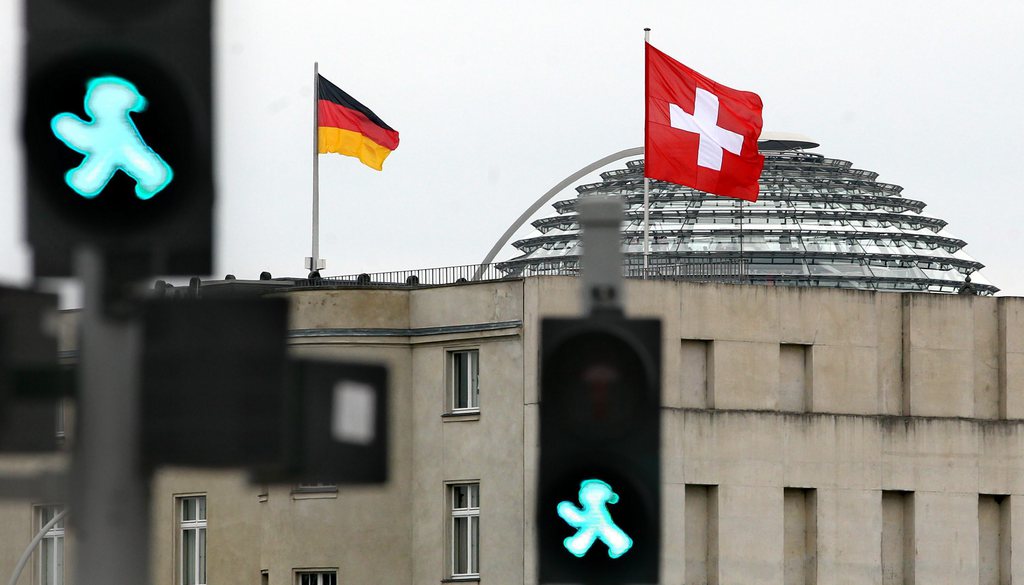A sign of the future or merely buying time?

Switzerland is trying to convince as many countries as possible to accept withholding tax deals in an effort to avoid an automatic exchange of information. The success of this strategy hinges largely on Germany’s response.
“The treaty with Germany is much like a blueprint. It could open doors to other countries. If it comes into force I could imagine that Italy would also sign such a treaty,” Peter V Kunz, professor of economic law at Bern University, told swissinfo.ch. “That in turn could awaken interest from France.”
Switzerland has already signed treaties with Germany, Britain and Austria that are planned to come into force on January 1, 2013. But the German deal faces the threat of being turned down by its parliament where the left leaning “red-green” political coalition holds a big majority in one of the two chambers.
The treaty would legalise the undeclared Swiss bank accounts held by Germans citizens. Swiss banks would deduct a one-off levy for backdated assets and then impose a withholding tax on future income earned for those account holders who do not want to reveal their identities to the German authorities.
It is estimated that these levies would yield up to €11 billion (SFr13 billion) to the German tax coffers, although no time frame was given for this bonanza.
German/Swiss opposition
German Social Democrats and Greens have criticised the “indulgencies” in the deal that would allow tax offenders to remain anonymous and various other “loopholes” in the text. They also argue that the treaty would favour cheats over honest tax payers.
The German parliament is expected to make a final decision in November, while voters in Switzerland are likely to have the final say on the agreement.
Two diametrically opposed political groups – the rightwing Campaign for an Independent and Neutral Switzerland (Cins) and the youth chapter of the Social Democratic Party are pushing for a referendum against the deal.
In the eyes of the rightwingers, the treaty would be “unacceptable and degrading” and a “further capitulation” to foreign pressure. The left leaning Young Social Democrats want to see an end to banking secrecy and the adoption of automatic exchange of tax information.
The deadline for gathering signatures expires at the end of September which could pave the way for a referendum on November 25.
Olive branch
Withholding tax is Switzerland’s response to increasing international pressure against banking secrecy. “We are hardly going to win a global round of applause because many countries are demanding an automatic exchange of information,” Michael Ambühl, head of the State Secretariat for International Financial Matters, told the Neue Zürcher Zeitung newspaper.
But he added that he knew of “hardly any experts in these countries that do not view withholding tax as an interesting alternative.”
“The difference between now and before is that Switzerland is no longer simply saying no,” Ambühl said. “We have offered a convincing alternative.”
Switzerland had held expert talks with the governments and other stakeholders at various countries, also outside of Europe, without gaining a concrete indication of which one would be willing to open negotiations.
Willing partners?
It is clear that the highly indebted countries of Greece and Spain would be interested in such deals because it would allow them to collect revenues for their ailing coffers in the short-term, according to economics expert Kunz.
Beyond that Kunz could imagine that Switzerland could conclude similar deals with countries such as China, India and Russia. He believes that is “important” for Switzerland to establish a “new standard to automatic data exchange” with its withholding tax proposal.
The treaty with Germany could act as a spark, at least within Europe. Countries such as Russia or China are “less important”, but Germany could act like a locomotive within the European Union. Germans have deposited the most undeclared money in Switzerland, followed by Italy.
If the treaty with Germany fails then “the idea of a withholding tax is dead”, according to Zurich banking expert Hans Geiger, who believes that the deal with Germany formed the basis of a similar treaty with Britain.
Here to stay or gone tomorrow?
The treaty contains a most favoured nation clause “which means that if Germany improves its position then Britain’s outlook would also be improved”, Geiger told swissinfo.ch. The failure of the German deal would mean that “the foundation of the British treaty, at least in its current form, would be lacking.”
However, Sergio Rossi, economics professor at Fribourg University, does not think that the failure of the German treaty would necessarily influence other countries not to sign.
Nevertheless, Rossi believes that it is important both for Swiss banks and German clients to get the treaty in force. “If there is no agreement it would signal a capital flight of German clients to tax havens like Singapore or Hong Kong,” he told swissinfo.ch.
“Germany has an interest in agreeing to the treaty, but perhaps at a higher tax rate,” Rossi added. “There is already significant pressure in Germany to increase this rate.”
Rossi views the withholding tax treaties as “buying time” during a “transition phase” that would push “an automatic exchange of information as far away as possible”.
“The Swiss fiscal refuge is over,” ex-Swiss National Bank chief Philipp Hildebrand said in a Wednesday television interview.
Hildebrand says he thinks Swiss banking secrecy as it exists today will be a thing of the past in coming years as more and more countries crack down on tax evaders.
“Switzerland and its banking system should assume that in five to ten years when a foreign client comes and opens a Swiss bank account, his name, the date he opens the account and the bank’s name will be automatically transferred to his country’s treasury,” said Hildebrand.
He was appointed head of the top Swiss banking body in January 2010 after having been the mastermind behind the SNB’s $60 billion (SFr72 billion) rescue package for Switzerland’s largest private bank, UBS, in October 2008, a period which Hildebrand described as “terrible”.
March 13, 2009: Following pressure from the Organisation for Co-operation and Development (OECD), the Swiss government agreed to adopt OECD standards on administrative assistance in tax matters. By doing so, Switzerland agreed to offer assistance not only in cases on tax fraud, but also in some cases of evasion. Since then, Switzerland has renegotiated double taxation treaties with more than 30 countries.
June 22, 2009: Former Swiss Finance Minister Hans-Rudolf Merz and his German counterpart Peer Steinbrück agreed on revisions to the double taxation treaty between the two countries.
September 21, 2011: Current Swiss Finance Minister Eveline Widmer-Schlumpf and her current German counterpart Wolfgang Schäuble signed a Rubik withholding tax agreement in Berlin. The German Social Democratic Party (SPD), Greens and other left leaning parties criticised the proposed regulations as being too soft on tax cheats.
March 5, 2012: The European Commission warned that the Rubik treaties with both Germany and Britain contained elements that violated EU rules and in particular clashed with an existing withholding tax agreement between the EU and Switzerland.
April 5, 2012: Switzerland and Germany revised their deal including a provision to increase tax rates on undeclared legacy assets.
April 17, 2012: The EC gives the revised deals with Germany and Britain (which was also altered to meet objections) the green light. The agreements were passed as being “fully in line with EU laws”.
April 25, 2012: The German government approved the revised deal, but the SPD and Green parties determined to fight against its implementation in parliament.
June 2012: Following a positive vote in the Swiss Senate, the House of Representatives passed the treaty. However, the Young Socialist and the rightwing Cins group launched a referendum to oppose the deal.
(Adapted from German by Matthew Allen)

In compliance with the JTI standards
More: SWI swissinfo.ch certified by the Journalism Trust Initiative



You can find an overview of ongoing debates with our journalists here. Please join us!
If you want to start a conversation about a topic raised in this article or want to report factual errors, email us at english@swissinfo.ch.